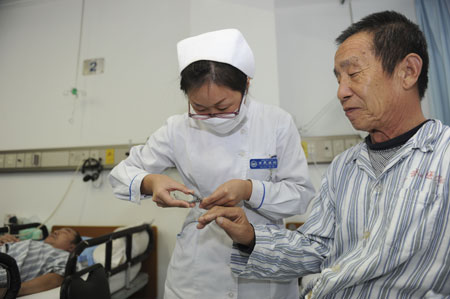Nursing in crisis
The lure of high pay
Her ambition to emigrate has not been deterred by the thought of having to go back to school and pass another country's national nursing exam.
|
At Xuan Wu Hospital in Beijing, a nurse clips a patient's fingernails. On October 19, the Beijing Health Bureau proposed the decade-old 9 yuan daily nursing charge be raised ten times to 90 yuan a day. |
Lin Lin is not alone in wanting to leave China. At Shanghai's No.2 Medical University, 44 of 50 graduating nurses have passed American nursing exams.
At a medical school in Nanjing, 40 percent of the nursing students planned to seek employment overseas, said the school's director.
Mao Qun'an, a spokesman from the Ministry of Health, told Guangzhou Daily recently that both external and internal factors are causing the flight of nurses from China.
"The lure of higher pay, better recognition of their contribution, increased prospects and immigration opportunities are enticing Chinese nurses who are struggling in China for acknowledgment," he said.
The situation is even worse in the city of Weifang, where Wen Mingchun is the director of an asthma treatment hospital. He knows nurses who have quit to work in massage parlors. "This is very sad," he said, noting that the starting salary for a nurse graduate in his city is only 500 yuan ($77) a month.
A survey by MyCos, an occupational skills evaluation agency in Beijing, indicated that following four years' of training a nurse in major centers can expect to earn 2,268 yuan a month, still below the national average of 2,369 yuan.
Nurses say part of the reason their contribution is often discounted is because their services are not big revenue generators for hospital.
Public hospitals in China are required to generate the vast majority of their revenues from patients. Government subsidies cover only 5 to 10 percent of a hospital's operating cost, according to China Newsweek magazine.
A typical top-tier hospital charges patients a daily nursing fee of just nine yuan ($1.4), a rate that was set by government policy in 2001.
 0
0 







